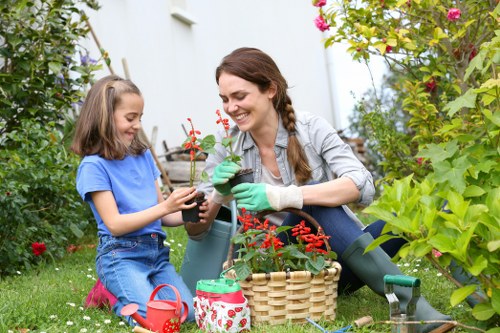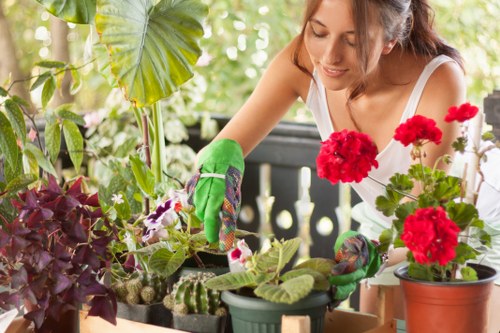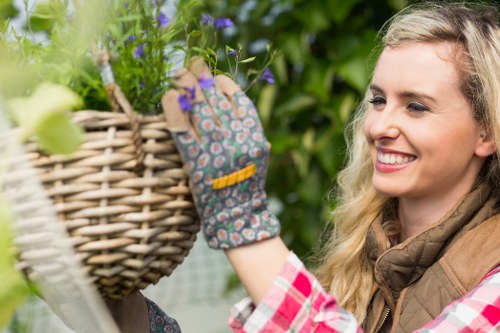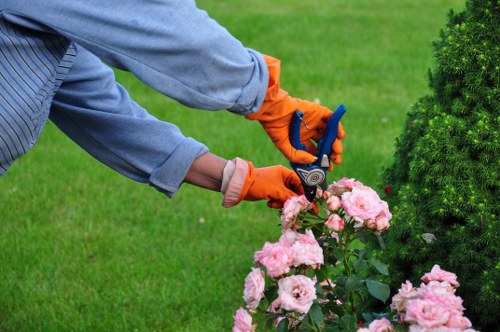Gardening in Chapel Hill: Cultivating Your Green Paradise

The Joy of Gardening in Chapel Hill
Gardening in Chapel Hill offers a unique blend of climate, soil, and community support that makes cultivating a beautiful garden both enjoyable and rewarding. Whether you're a seasoned gardener or just starting out, Chapel Hill provides the perfect environment to grow a variety of plants, flowers, and vegetables.
The region's mild winters and warm summers create an ideal growing season, allowing for a diverse range of plants to thrive. Additionally, the rich, fertile soil in Chapel Hill contributes to healthy plant growth, ensuring that your garden flourishes throughout the year.
Community gardens and local plant nurseries are abundant in Chapel Hill, providing gardeners with access to a wide selection of plants, tools, and expert advice. These resources make it easier for residents to embark on their gardening journey and maintain their green spaces effectively.

Understanding the Chapel Hill Climate
The climate in Chapel Hill is classified as humid subtropical, characterized by hot, humid summers and mild winters. This climate is conducive to growing a wide variety of plants, including both annuals and perennials. Understanding the local climate is essential for selecting the right plants and planning your garden layout.
Blossoming in the spring and thriving in the summer, many plants adapted to Chapel Hill's climate can withstand the heat and occasional drought conditions. Additionally, the region receives ample rainfall, which supports healthy plant growth and reduces the need for frequent watering.
However, gardeners should be mindful of the occasional frost during winter months, which can affect sensitive plants. Implementing strategies such as mulching and selecting frost-resistant varieties can help protect your garden from unexpected cold snaps.

Choosing the Right Plants for Your Chapel Hill Garden
Selecting the appropriate plants is crucial for a thriving garden in Chapel Hill. The region's climate and soil conditions favor a wide range of flora, allowing gardeners to experiment with various species and cultivars.
Perennials
Perennials like hostas, daylilies, and lavender are excellent choices for Chapel Hill gardens. These plants return year after year, providing consistent beauty and requiring less maintenance compared to annuals.
Annuals
For those who enjoy vibrant, seasonal displays, annuals such as marigolds, petunias, and zinnias offer a burst of color throughout the growing season. Annuals are perfect for adding variety and filling gaps in your garden layout.
Vegetables and Herbs
Chapel Hill's climate is ideal for growing a variety of vegetables and herbs. Tomatoes, peppers, basil, and rosemary are popular choices that can thrive in home gardens. Incorporating edible plants not only enhances your garden's aesthetic but also provides fresh produce for your kitchen.

Essential Gardening Tips for Chapel Hill Residents
Gardening in Chapel Hill can be highly rewarding with the right approach. Here are some essential tips to help you cultivate a successful garden:
- Soil Preparation: Test your soil to determine its pH and nutrient levels. Amend the soil with compost or organic matter to improve fertility and drainage.
- Watering: Water your garden early in the morning to reduce evaporation and prevent fungal diseases. Install a drip irrigation system for efficient water usage.
- Mulching: Apply mulch around your plants to retain moisture, suppress weeds, and regulate soil temperature.
- Pruning: Regularly prune your plants to promote healthy growth and remove any diseased or dead branches.
- Pest Management: Monitor your garden for pests and diseases. Use natural remedies or organic pesticides to protect your plants without harming beneficial insects.
Seasonal Gardening Activities
Adapting your gardening activities to the seasons can enhance your garden's productivity and health:
- Spring: Start planting early-season vegetables, prepare garden beds, and sow seeds for flowers.
- Summer: Focus on maintaining moisture levels, harvesting produce, and managing pests.
- Fall: Plant late-season crops, clean up garden debris, and prepare your garden for the winter months.
- Winter: Protect sensitive plants, plan next year's garden layout, and conduct maintenance on gardening tools.

Local Gardening Services and Resources
Chapel Hill boasts a variety of local gardening services and resources that can support both novice and experienced gardeners. From professional landscaping services to community gardening programs, there are numerous options available to enhance your gardening experience.
Professional Landscaping Services
Hiring a professional landscaper can help you design and maintain a beautiful garden. Services often include landscape design, installation, lawn care, and ongoing maintenance. Local companies understand the unique climate and soil conditions of Chapel Hill, ensuring that your garden is both aesthetically pleasing and sustainably managed.
Community Gardens
Participating in community gardens is a great way to connect with fellow gardening enthusiasts. These shared spaces provide opportunities to learn new techniques, share resources, and cultivate a sense of community while growing your own plants.
Local Nurseries and Garden Centers
Chapel Hill is home to several nurseries and garden centers that offer a wide selection of plants, tools, and expert advice. These establishments often host workshops and events, providing valuable information and inspiration for your gardening projects.
Gardening Clubs and Organizations
Joining a gardening club or organization can enhance your gardening knowledge and skills. These groups often organize events, provide access to specialized resources, and offer a platform for sharing experiences and tips with other members.
Exploring Nearby Areas for Gardening Enthusiasts
- Durham: Located just a few miles from Chapel Hill, Durham offers expansive parks and additional nurseries perfect for gardening supplies.
- Oak Ridge: This nearby area is known for its community gardens and local gardening events.
- Morrisville: Situated close to Chapel Hill, Morrisville features a variety of landscaping services and plant nurseries.
- Carolina: With its proximity to Chapel Hill, Carolina offers unique plant varieties and specialized gardening centers.
- Chapel Hill West: A vibrant area with numerous green spaces and community gardening initiatives.
- Southern Village: Known for its beautiful residential gardens and local gardening workshops.
- Hope Valley: Features serene parks and additional resources for gardening enthusiasts.
- Stinson: A quaint area nearby with charming gardens and specialized plant shops.
- Hudson: Offers a mix of urban and suburban gardening opportunities, including rooftop gardens.
- University Park: Home to several botanical gardens and research facilities focused on horticulture.
- West Raleigh: Although slightly farther, it provides extensive landscaping services and plant suppliers.
- Butner: Known for its agricultural heritage and local farming markets.
- Kernersville: Offers a blend of traditional and modern gardening practices with various community programs.
- Burlington: Provides access to large garden centers and specialized gardening classes.
Creating a Sustainable Garden in Chapel Hill
Embracing sustainability in your garden not only benefits the environment but also enhances the health and longevity of your plants. Here are some strategies to create a sustainable garden in Chapel Hill:
- Composting: Recycle kitchen scraps and garden waste to create nutrient-rich compost that improves soil health.
- Rainwater Harvesting: Collect and utilize rainwater for gardening to reduce reliance on municipal water sources.
- Native Plants: Incorporate native plant species that are well-adapted to Chapel Hill's climate, requiring less water and maintenance.
- Biodiversity: Promote biodiversity by planting a variety of species, which can attract beneficial insects and pollinators.
- Organic Practices: Use organic fertilizers and pest control methods to maintain a healthy, chemical-free garden.
Energy-Efficient Gardening Techniques
Implementing energy-efficient practices can further enhance the sustainability of your garden:
- Efficient Lighting: Use solar-powered garden lights to minimize energy consumption.
- Drip Irrigation: Install drip irrigation systems to provide precise watering, reducing water waste.
- Mulching: Apply mulch to conserve soil moisture, lower soil temperatures, and reduce the need for frequent watering.
- Green Roofing: Consider green roofing options if you have limited space, promoting insulation and reducing energy costs.
Supporting Local Wildlife
A sustainable garden also supports local wildlife, creating a balanced ecosystem:
- Birdhouses: Install birdhouses to attract birds that help control pests.
- Bee Hotels: Provide habitats for bees and other pollinators, which are essential for plant reproduction.
- Water Features: Adding ponds or birdbaths can offer water sources for various wildlife species.
- Native Plants: Planting native species provides food and shelter for local fauna.
Maximizing Your Gardening Space
Optimizing your gardening space in Chapel Hill can lead to a more productive and aesthetically pleasing garden:
Vertical Gardening
Utilize vertical space by incorporating trellises, vertical planters, and hanging baskets. This approach is especially beneficial for small gardens, allowing you to grow more plants without taking up additional ground space.
Container Gardening
Containers offer flexibility and mobility, making them ideal for patios, balconies, and other limited spaces. They also allow for greater control over soil conditions and can be moved to optimize sunlight exposure.
Raised Beds
Raised beds improve soil drainage and fertility, making it easier to manage your garden. They also provide a defined structure, which can enhance the overall design and organization of your garden space.
Companion Planting
Pairing complementary plants can enhance growth, deter pests, and improve overall garden health. For example, planting basil alongside tomatoes can boost tomato growth and flavor while repelling harmful insects.
Efficient Layout
Plan your garden layout to maximize sunlight exposure and airflow. Group plants with similar sunlight and watering requirements together to ensure optimal growth and reduce maintenance efforts.
Seasonal Flowering Plants for Chapel Hill Gardens
Incorporating seasonal flowering plants adds color and vibrancy to your Chapel Hill garden throughout the year:
Spring Blooms
- Tulips: Bright and cheerful, tulips are a staple in spring gardens.
- Daffodils: Known for their vibrant yellow hues, daffodils signal the arrival of spring.
- Hyacinths: Fragrant and colorful, hyacinths add both scent and beauty.
Summer Blooms
- Sunflowers: Tall and striking, sunflowers are perfect for adding height and visual interest.
- Zinnias: Available in a variety of colors, zinnias are excellent for continuous blooming.
- Lavender: Lavender not only adds color but also attracts pollinators and offers a soothing fragrance.
Fall Blooms
- Chrysanthemums: Known for their rich colors, chrysanthemums are quintessential fall flowers.
- Asters: Asters provide a burst of color and attract beneficial insects.
- Sedum: Also known as stonecrop, sedum offers late-season blooms and winter interest.
Winter Interest
- Evergreens: Evergreens maintain year-round structure and color in your garden.
- Hellebores: Also known as Lenten roses, hellebores bloom in late winter with elegant flowers.
- Witch Hazel: Witch hazel produces fragrant blooms even in the coldest months.
Gardening Tools and Equipment Essentials
Having the right tools and equipment is essential for maintaining a healthy and productive garden in Chapel Hill. Investing in quality gardening tools can make your gardening tasks easier and more efficient:
Basic Tools
- Hand Trowel: Ideal for digging small holes, transplanting, and removing weeds.
- Pruning Shears: Essential for trimming and shaping plants and removing dead or diseased branches.
- Garden Fork: Useful for loosening soil and turning compost.
- Watering Can or Hose: Necessary for providing adequate moisture to your plants.
- Gloves: Protect your hands from thorns, dirt, and potential irritants.
Advanced Equipment
- Lawn Mower: Keeps your lawn neat and promotes healthy grass growth.
- Rototiller: Helps in preparing large garden beds by breaking up and aerating the soil.
- Wheelbarrow: Facilitates the transport of soil, plants, and other materials around your garden.
- Garden Kneeler: Provides comfort and support during extended periods of planting and weeding.
Storage Solutions
Organizing your gardening tools and equipment ensures they remain in good condition and are easily accessible:
- Tool Shed: A dedicated space to store tools and protect them from the elements.
- Tool Rack: Keeps frequently used tools organized and within reach.
- Storage Bins: Useful for grouping smaller items and accessories.
Gardening Events and Workshops in Chapel Hill
Participating in gardening events and workshops can enhance your gardening knowledge and connect you with like-minded individuals:
Local Workshops
Chapel Hill hosts a variety of gardening workshops throughout the year, covering topics such as organic gardening, landscape design, and pest management. These workshops are often led by local experts and provide hands-on learning experiences.
Garden Tours
Attending garden tours allows you to explore different garden styles and gain inspiration for your own space. These tours showcase the creativity and diversity of Chapel Hill's gardening community.
Seasonal Festivals
Seasonal festivals celebrate the beauty and bounty of gardens, featuring plant sales, demonstrations, and educational seminars. These events are perfect opportunities to expand your gardening repertoire and meet fellow enthusiasts.
Plant Exchanges
Engaging in plant exchanges encourages the sharing of plant varieties and gardening tips. It's a great way to diversify your garden and build connections within the gardening community.
Volunteer Opportunities
Volunteering at local gardens and green spaces supports community initiatives and provides valuable hands-on experience. It's also an excellent way to give back and promote sustainable gardening practices.
Innovative Gardening Trends in Chapel Hill
Staying updated with the latest gardening trends can help you create a modern and efficient garden:
Vertical Gardens
Vertical gardening maximizes space usage by growing plants upward rather than outward. This trend is particularly useful for urban gardens and small spaces.
Smart Gardening
Incorporating technology into your gardening practices, such as automated watering systems and smart sensors, can enhance efficiency and plant health.
Edible Landscaping
Combining aesthetics with functionality, edible landscaping integrates fruit trees, vegetables, and herbs into ornamental garden designs.
Sustainable Practices
Emphasizing sustainability, many gardeners are adopting eco-friendly practices like composting, rainwater harvesting, and using native plants to create environmentally responsible gardens.
Pollinator Gardens
Creating pollinator-friendly gardens supports essential insect populations and promotes biodiversity. Planting nectar-rich flowers and providing habitats helps attract bees, butterflies, and other pollinators.
Herb Spirals
An herb spiral is a space-efficient design that allows for the cultivation of multiple herbs in a compact area. This innovative structure maximizes growing conditions and adds visual interest to the garden.
Permaculture
Permaculture focuses on designing gardens that mimic natural ecosystems, promoting sustainability and resilience. This approach integrates plants, animals, and structures to create harmonious and productive landscapes.
Enhancing Garden Aesthetics
Creating an aesthetically pleasing garden involves thoughtful design and attention to detail. Here are some tips to enhance the beauty of your Chapel Hill garden:
Color Coordination
Choose a color palette that complements your home and surroundings. Harmonious color schemes can create a cohesive and visually appealing garden.
Focal Points
Incorporate focal points such as statues, water features, or unique plants to draw attention and add interest to your garden.
Pathways and Walkways
Designing pathways and walkways not only provides structure but also encourages exploration and enjoyment of your garden space.
Lighting
Strategic lighting enhances the ambiance of your garden in the evenings, highlighting key features and ensuring safety.
Garden Art and Decor
Adding garden art and decorative elements can personalize your garden and reflect your individual style.
Plant Varieties and Textures
Incorporate a mix of plant varieties and textures to create depth and visual interest. Combining different leaf shapes, plant heights, and growth habits can add complexity to your garden design.
Winterizing Your Chapel Hill Garden
Preparing your garden for the winter months is essential to protect your plants and ensure their health for the upcoming growing season:
Protecting Plants
- Mulching: Apply a thick layer of mulch to insulate plant roots and prevent soil erosion.
- Covering Plants: Use burlap or other protective covers to shield sensitive plants from frost and harsh winds.
- Pruning: Remove dead or damaged branches to reduce the risk of disease and encourage healthy growth in spring.
Soil Care
Improving soil health during the winter can lead to a more productive garden in the spring:
- Soil Testing: Conduct a soil test to identify nutrient deficiencies and adjust accordingly.
- Composting: Continue composting to create rich, organic matter for future planting.
- Cover Crops: Plant cover crops to protect and enrich the soil during the winter months.
Tool Maintenance
Properly maintaining your gardening tools ensures they remain in good condition and ready for use:
- Cleaning: Remove dirt and debris from tools to prevent rust and wear.
- Sharpening: Sharpen blades and edges to maintain effectiveness.
- Storage: Store tools in a dry, secure location to protect them from the elements.
Planning for Spring
Use the winter months to plan and prepare for the next gardening season:
- Garden Layout: Sketch your garden layout, considering crop rotation and plant placement.
- Seed Selection: Choose seeds and plants that you want to grow in the upcoming season.
- Budgeting: Allocate funds for new plants, tools, and other gardening needs.
Final Thoughts: Embrace the Gardening Lifestyle in Chapel Hill
Gardening in Chapel Hill is more than just a hobby; it's a way to connect with nature, enhance your living space, and contribute to a sustainable environment. By understanding the local climate, selecting the right plants, and utilizing available resources, you can create a thriving garden that brings beauty and joy throughout the year.
Whether you're cultivating a small balcony garden or managing a large backyard oasis, the key to successful gardening lies in planning, care, and a passion for growth. Embrace the gardening lifestyle in Chapel Hill and watch your green paradise flourish.
Ready to transform your garden? Contact us today to book your gardening service and start your journey towards a vibrant and sustainable garden in Chapel Hill!
